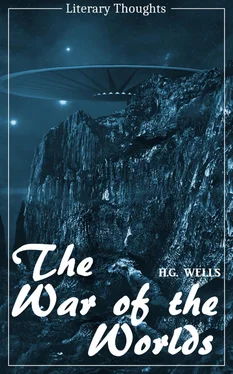I rose and walked unsteadily up the steep incline of the bridge. My mind was blank wonder. My muscles and nerves seemed drained of their strength. I dare say I staggered drunkenly. A head rose over the arch, and the figure of a workman carrying a basket appeared. Beside him ran a little boy. He passed me, wishing me good night. I was minded to speak to him, but did not. I answered his greeting with a meaningless mumble and went on over the bridge.
Over the Maybury arch a train, a billowing tumult of white, firelit smoke, and a long caterpillar of lighted windows, went flying south – clatter, clatter, clap, rap, and it had gone. A dim group of people talked in the gate of one of the houses in the pretty little row of gables that was called Oriental Terrace. It was all so real and so familiar. And that behind me! It was frantic, fantastic! Such things, I told myself, could not be.
Perhaps I am a man of exceptional moods. I do not know how far my experience is common. At times I suffer from the strangest sense of detachment from myself and the world about me; I seem to watch it all from the outside, from somewhere inconceivably remote, out of time, out of space, out of the stress and tragedy of it all. This feeling was very strong upon me that night. Here was another side to my dream.
But the trouble was the blank incongruity of this serenity and the swift death flying yonder, not two miles away. There was a noise of business from the gasworks, and the electric lamps were all alight. I stopped at the group of people.
"What news from the common?" said I.
There were two men and a woman at the gate.
"Eh?" said one of the men, turning.
"What news from the common?" I said.
"'Ain't yer just been there?" asked the men.
"People seem fair silly about the common," said the woman over the gate. "What's it all abart?"
"Haven't you heard of the men from Mars?" said I; "the creatures from Mars?"
"Quite enough," said the woman over the gate. "Thenks"; and all three of them laughed.
I felt foolish and angry. I tried and found I could not tell them what I had seen. They laughed again at my broken sentences.
"You'll hear more yet," I said, and went on to my home.
I startled my wife at the doorway, so haggard was I. I went into the dining room, sat down, drank some wine, and so soon as I could collect myself sufficiently I told her the things I had seen. The dinner, which was a cold one, had already been served, and remained neglected on the table while I told my story.
"There is one thing," I said, to allay the fears I had aroused; "they are the most sluggish things I ever saw crawl. They may keep the pit and kill people who come near them, but they cannot get out of it. . . . But the horror of them!"
"Don't, dear!" said my wife, knitting her brows and putting her hand on mine.
"Poor Ogilvy!" I said. "To think he may be lying dead there!"
My wife at least did not find my experience incredible. When I saw how deadly white her face was, I ceased abruptly.
"They may come here," she said again and again.
I pressed her to take wine, and tried to reassure her.
"They can scarcely move," I said.
I began to comfort her and myself by repeating all that Ogilvy had told me of the impossibility of the Martians establishing themselves on the earth. In particular I laid stress on the gravitational difficulty. On the surface of the earth the force of gravity is three times what it is on the surface of Mars. A Martian, therefore, would weigh three times more than on Mars, albeit his muscular strength would be the same. His own body would be a cope of lead to him. That, indeed, was the general opinion. Both The Times and the Daily Telegraph, for instance, insisted on it the next morning, and both overlooked, just as I did, two obvious modifying influences.
The atmosphere of the earth, we now know, contains far more oxygen or far less argon (whichever way one likes to put it) than does Mars. The invigorating influences of this excess of oxygen upon the Martians indisputably did much to counterbalance the increased weight of their bodies. And, in the second place, we all overlooked the fact that such mechanical intelligence as the Martian possessed was quite able to dispense with muscular exertion at a pinch.
But I did not consider these points at the time, and so my reasoning was dead against the chances of the invaders. With wine and food, the confidence of my own table, and the necessity of reassuring my wife, I grew by insensible degrees courageous and secure.
"They have done a foolish thing," said I, fingering my wineglass. "They are dangerous because, no doubt, they are mad with terror. Perhaps they expected to find no living things – certainly no intelligent living things."
"A shell in the pit" said I, "if the worst comes to the worst will kill them all."
The intense excitement of the events had no doubt left my perceptive powers in a state of erethism. I remember that dinner table with extraordinary vividness even now. My dear wife's sweet anxious face peering at me from under the pink lamp shade, the white cloth with its silver and glass table furniture – for in those days even philosophical writers had many little luxuries – the crimson-purple wine in my glass, are photographically distinct. At the end of it I sat, tempering nuts with a cigarette, regretting Ogilvy's rashness, and denouncing the shortsighted timidity of the Martians.
So some respectable dodo in the Mauritius might have lorded it in his nest, and discussed the arrival of that shipful of pitiless sailors in want of animal food. "We will peck them to death tomorrow, my dear."
I did not know it, but that was the last civilised dinner I was to eat for very many strange and terrible days.
CHAPTER EIGHT – FRIDAY NIGHT
The most extraordinary thing to my mind, of all the strange and wonderful things that happened upon that Friday, was the dovetailing of the commonplace habits of our social order with the first beginnings of the series of events that was to topple that social order headlong. If on Friday night you had taken a pair of compasses and drawn a circle with a radius of five miles round the Woking sand pits, I doubt if you would have had one human being outside it, unless it were some relation of Stent or of the three or four cyclists or London people lying dead on the common, whose emotions or habits were at all affected by the new-comers. Many people had heard of the cylinder, of course, and talked about it in their leisure, but it certainly did not make the sensation that an ultimatum to Germany would have done.
In London that night poor Henderson's telegram describing the gradual unscrewing of the shot was judged to be a canard, and his evening paper, after wiring for authentication from him and receiving no reply – the man was killed – decided not to print a special edition.
Even within the five-mile circle the great majority of people were inert. I have already described the behaviour of the men and women to whom I spoke. All over the district people were dining and supping; working men were gardening after the labours of the day, children were being put to bed, young people were wandering through the lanes love-making, students sat over their books.
Maybe there was a murmur in the village streets, a novel and dominant topic in the public-houses, and here and there a messenger, or even an eye-witness of the later occurrences, caused a whirl of excitement, a shouting, and a running to and fro; but for the most part the daily routine of working, eating, drinking, sleeping, went on as it had done for countless years – as though no planet Mars existed in the sky. Even at Woking station and Horsell and Chobham that was the case.
In Woking junction, until a late hour, trains were stopping and going on, others were shunting on the sidings, passengers were alighting and waiting, and everything was proceeding in the most ordinary way. A boy from the town, trenching on Smith's monopoly, was selling papers with the afternoon's news. The ringing impact of trucks, the sharp whistle of the engines from the junction, mingled with their shouts of "Men from Mars!" Excited men came into the station about nine o'clock with incredible tidings, and caused no more disturbance than drunkards might have done. People rattling Londonwards peered into the darkness outside the carriage windows, and saw only a rare, flickering, vanishing spark dance up from the direction of Horsell, a red glow and a thin veil of smoke driving across the stars, and thought that nothing more serious than a heath fire was happening. It was only round the edge of the common that any disturbance was perceptible. There were half a dozen villas burning on the Woking border. There were lights in all the houses on the common side of the three villages, and the people there kept awake till dawn.
Читать дальше












